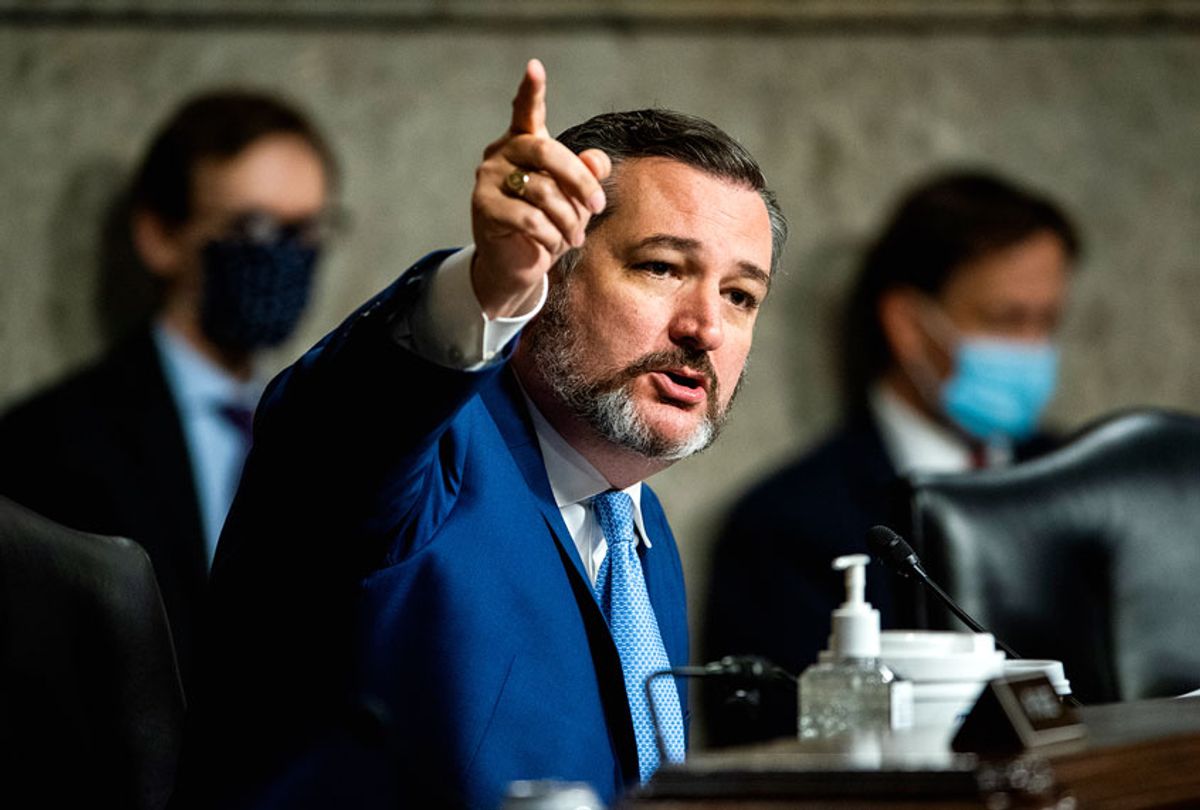At President Trump's personal request, Sen. Ted Cruz, R-Texas, has agreed to argue a longshot lawsuit before the U.S. Supreme Court that has been characterized as "insane," "garbage," and "simply mad."
The lawsuit was filed earlier this week by Cruz's fellow Texan Ken Paxton, attorney general of the Lone Star State and current target of an FBI bribery investigation. It was quickly met with derision from legal experts as a baseless and unconstitutional assault on the rights of voters.
There is no evidence of fraud in the presidential election, according to election officials in every state. President-elect Joe Biden won with a record-setting 81 million votes — a margin of victory of more than seven million votes over Trump.
Trump asked Cruz on Tuesday to argue the case, which was filed the previous night and asks the court to block what Paxton calls "unlawful and constitutionally tainted votes" about to be cast by electors from the key battleground states of Georgia, Michigan, Pennsylvania and Wisconsin.
Paxton's complaint, which cites bogus claims warmed over after weeks of failed GOP legal efforts in state courts, aims to convince the justices that those states made illegal procedural changes ahead of the election to limit the spread of the coronavirus, and the votes from those states should be invalidated.
Pennsylvania has already successfully argued that such an action would violate due process rights for millions of voters.
Legal experts immediately dismissed the suit's chances of getting a hearing at the nation's highest court. But on Wednesday afternoon, 17 Republican-led states, led by Missouri, joined an amicus brief in support of the quixotic crusade, despite the fact that several of those states had themselves implemented the same procedures that the lawsuit now seeks to invalidate post hoc.
Harvard Law professor Noah Feldman, writing in a Bloomberg op-ed, called it a lawsuit from "Trump's fantasy world," and said it amounted to asking the Supreme Court to engage in "a constitutional coup d'état and give Trump a second term." Republican attorney George Conway, husband of former top Trump official Kellyanne Conway, said the exercise was "insane," and top election-law expert Rick Hasen called it "utter garbage" and "dangerous."
Even Cruz's Republican Senate colleagues have spurned the idea.
Sen. Mitt Romney, R-Utah, called it "madness" to ask the Court to override voters. Sen. Ben Sasse, R-Neb., who along with Romney has been among a handful of GOP senators to vocally criticize Trump, pointed out that Texas' solicitor general — the official who typically represents the state before the Supreme Court, and a position Cruz held before being elected to the Senate — declined to sign on to the suit.
Still, Cruz conceded to the will of a man who once called his wife ugly and insinuated that his father conspired in the assassination of John F. Kennedy.
Cruz may well believe, as experts widely agree, that the Court will simply reject Paxton's application outright, as Bush-appointed Justice Samuel Alito did in a one-sentence order to Pennsylvania Republicans just this week. But Ilya Somin, a professor at George Mason University School of Law, noted that because the complaint falls within the original jurisdiction of the Supreme Court — as opposed to trickling up from a lower-court appeal — there is an outside chance the suit gets a hearing. That would put Cruz on the hot seat.
It is unclear why Cruz, an attorney experienced in constitutional law, would take such a risk. As Sasse pointed out, it may have to do with Paxton's criminal exposure. Sasse summed up the filing as a "PR stunt" that amounted to "a fella begging for a pardon."
Hasen, a law professor at the University of California, Irvine, agreed, tweeting on Tuesday that Paxton "should be sanctioned" for abusing his office to angle for a presidential pardon.
"It goes against the will of millions of voters," Hasen said. "He's going for a pardon with Trump."
Paxton faces dual threats: a federal probe into allegations that he committed bribery and abused his office on behalf of a wealthy political donor, and a state indictment for felony securities fraud.
The federal investigation was launched last month, but the fraud case has bounced around Texas trial courts for five years, reaching the state's highest criminal court before getting knocked back down to the county level. Paxton has still not faced trial.
A pardon by Trump would end the federal investigation, but the president has no power over state criminal charges.



Shares